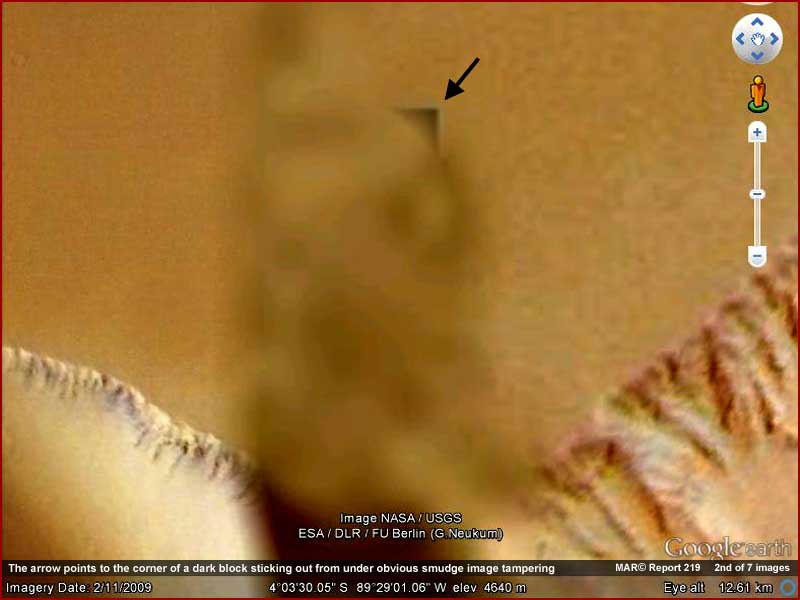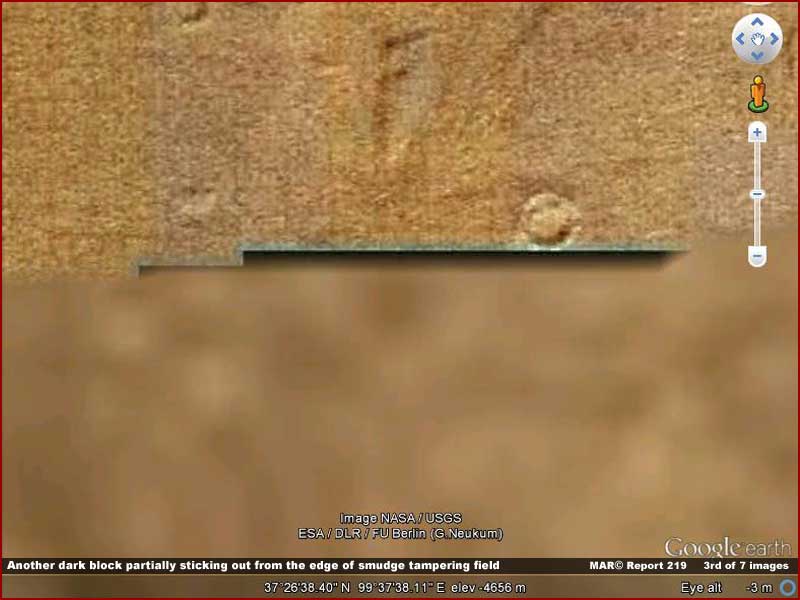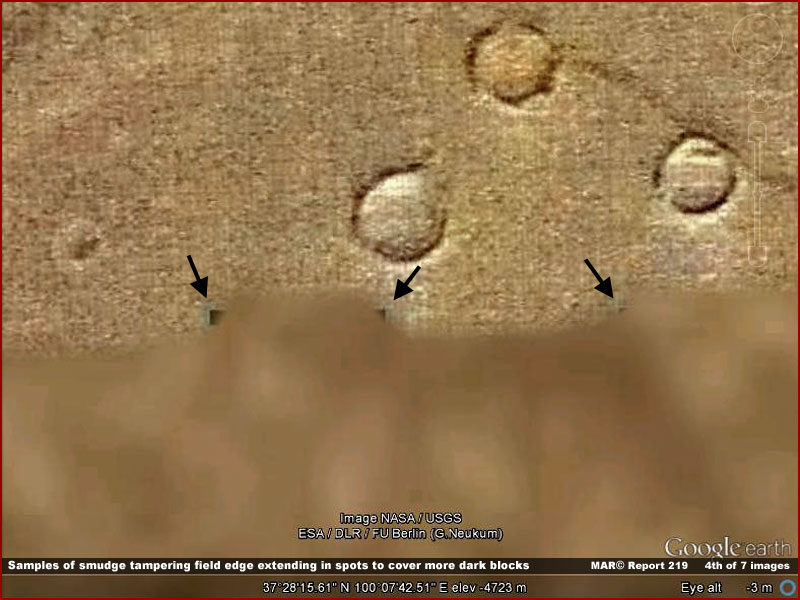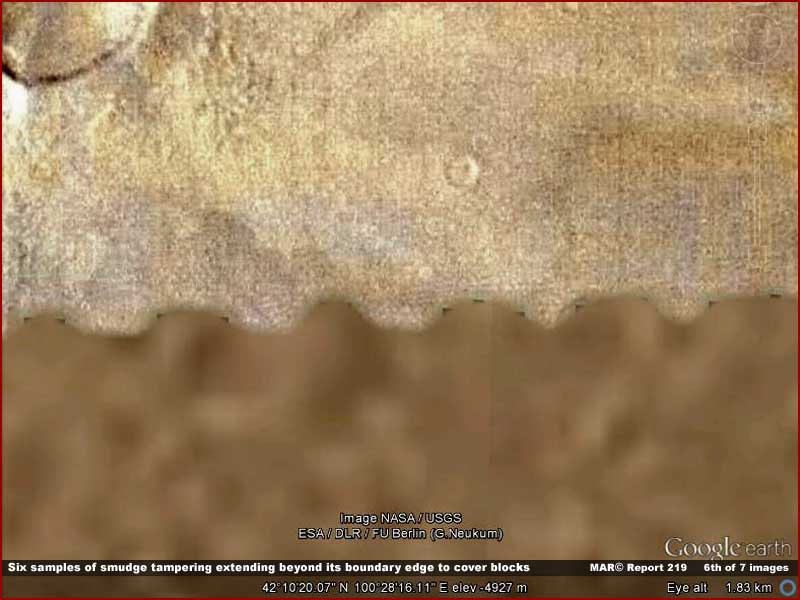
GOOGLE MARS OBFUSCATION
Report #219
April 24, 2012

This report will perhaps add some
benefit in understanding that Google Earth/Mars material should never be dismissed
but also never be taken at face value either. A user must always be on the
look out for false issues when it comes to something that might be interpreted
as anomalous in Google Earth/Mars material.
For example, the above 1st image is of a slightly zoomed section of Google's
Global context view of Mars. Note that it visually gives an impression suggesting
that the overall view is made up of many strips joined together to form the
whole. With that assumption made, the user would likely then make a further
assumption that these are the strips drawn from the official science data.
However, if that is the impression conveyed, it is just not true and amounts
to false misdirection. The truth is that the strips in the above image are
yet more image tampering applications applied onto an existent whole surface
that already had a great deal of obscuring applications on it. In other words,
obfuscation on top of obfuscation. Take a look at the following evidence samples
and you will perhaps begin to understand what I am referring to.






The above progression of closer view images #2,
#3, #4, #5, #6 and #7 all are samples selected from the strips visible in
the Mars global view in image #1. All are taken from the straight linear edge
of those strips the edges of which you would expect to be just as straight
in these closer views but you'll note that they are not. All tell a story
and unfortunately that story is that nothing here is real except for obfuscation.
Here's my take. The grainy patterned background terrain is the original pre-release
imaging that was already very heavily obfuscated. However, subsequent processing
and compression in preparation for release produced too many large artifacts
in the form of geometric dark blocks that in someone's subsequent opinion
looked a little too much like structures that would likely produce future
public attention, questioning, and controversy. So a decision was made that
this would be asking for difficulties with the public and another round of
obfuscation was authorized to go on top of the original to eliminate the artifacts
even though they aren't real.
Note that there are essentially two distinct patterns of obfuscation layers.
One is the grainy patterned look that almost certainly represents the original
lower layer obfuscation work simply because the dark blocks are clearly on
top of it. The second is the soft diffuse and featureless smudge upper and
final layer that mimics the look of strips in the image #1 global view when
viewed at distance.
The obvious fluffy featureless smudge you see
in the above images is inadequately done with the smudge leaving small parts
of the dark geometric block evidence out to be seen. Humans doing this work
would not have made this mistake leaving small parts of the dark blocks out
and so that rules them out. They would have just made a new expanded overlapping
tampering field edge to cover the dark block portions.
However, an Artificial Intelligence (AI) super computer would have made this
mistake due to all of this evidence being at the conjunction edge of two different
tampering fields. Probably the subsequent second fluffy smudge tampering applications
were done at another facility and by another different AI programmed with
different priorities. The fluffy smooth texture suggests possibly the same
AI that does the Antarctica continent trying to mimic fog and cloud cover?
The AI likely defined the strip edges first and then filled in the center
areas in. However, as its work was reviewed, it was found that some of the
straight strip boundary edges missed portions of some of the artifact dark
blocks and so it had to go back and catch them with more smudge but applied
only in spots.
Now I long ago discovered that this is not easy for the AI's and their programming
used in this planetary satellite imaging to do in crossing field boundary
lines. They tend not to want to cross already established graphic field edges
into an adjacent different field and they don't like to make already established
straight lines at strip edges irregular by spot expanded extensions. So I
suspect that this difficulty played a roll in the AI applications not quite
covering every little bit of the artifact blocks at the strip boundary edges
as you see above.
The net result is that the easily identified final fluffy smooth tampering
applications tried but failed to completely hide the large dark blocks extending
over the strip edges. It may give the impression that careless image tampering
didn't quite hide civilization evidence in these spots. However, if any civilization
evidence was ever at these locations, it was thoroughly hidden by the original
grainy textured tampering which layers are so dense that nothing can be seen
of even fairly large terrain features and the only things that can be seen
are very large features like mountains, hills, impact craters, canyons, and
finally the dark compression blocks.
In retrospect, as long as the secrecy agenda is inclined to deal with the
cumbersome task of attempting to hide the truth they don't want us to know
about via modifying and manipulating the original science data imaging on
a massive scale, mistakes will be made just because of the sheer numbers and
scale involved and small bits and pieces of truth may find its way through
to us. However, when they convert over (and they will) to just making up and
designing computer graphics generated terrain from scratch no longer needing
to modify original exploration research imaging, even greater ignorance in
our world societies and institutions will prevail.
The key will be when the data released for public consumption starts demonstrating
really dramatic improvements in detail and clarity. Such "improvements"
will be reported as due to advancements in camera, processing, and communications
technology. Worse and most sickening, it will be believed and well received
by a clueless mainstream with a preference to remain that way.
I don't usually make reports just on obfuscation and of course I might be
off the mark here but I doubt it. Because giant Google is such a primary tool
used by the public, I think that it is essential that the public recognize
the limitations of its use and be ready to question and take everything with
a cautionary grain of salt as the saying goes. Google can be useful but only
if one is prepared to question what one sees and be ready to hold the giant's
foot to the fire on deception like this.
, Investigator
![]()